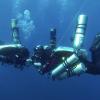Seafox, I would argue that the skills need for technical diving are not fundamentally different from those making any diver a good diver--proper trim, buoyancy control, situational awareness, team integrity, etc...
These skills are not just applicable to technical dives, but to all dives.
Training is the integral part to safe diving--rigorous training, education and practice is the foundation from which to build upon. The sad fact is that many recreational divers don't go out for training dives; instead they try to fine tune their skills on an actual dive, oblivious to the fine line they are skirting. I know a dive team who decided to extend their dive and enter deco on the fly at 125'. Their reasoning was that they had the extra gas and other divers were doing deco so it was OK.
VADiver, I agree that some of the basic skills you mention are fundamentally the same for rec and tec.
However, many others skills, and that's where the differences are important, are taught at the "technical" level.
I know very few rec divers that understand "awareness", (self, environment, team), the way you and I do, and have the skills to plan and complete a complex decompression, properly blow a bag, safely perform a blue water deco ascent, come to aid of a toxed diver and so on.
Those skills are not required of a rec divers but must be performed flawlessly by a tec diver.
As you are well aware, that requires many hours of very specific and pointed training. That's the point.
I am not suggesting that tec is better than rec.
One is not better than the other, but although they may look the same, they are different!
Hey, In the end what ever works works!
However, I am suggesting that it's not the same and technical diving is technical!




















